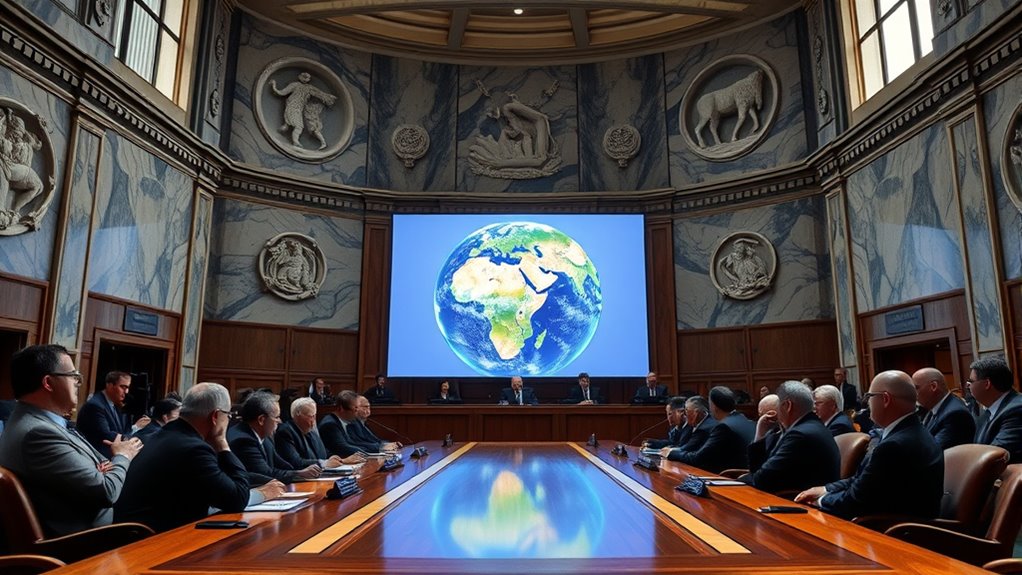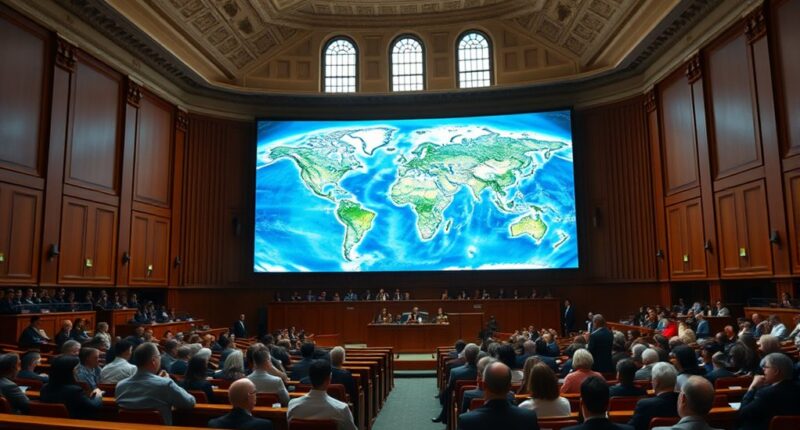The ICJ advisory opinion makes it clear that your government and corporations have legal duties to combat climate change, extending beyond borders. You play a role in holding them accountable for environmental impacts and respecting indigenous rights. Legal obligations now emphasize transparency, justice, and sustainability, ensuring actions align with international standards. Understanding these responsibilities can empower you to advocate for stronger climate policies—there’s much more to explore on how legal frameworks shape climate justice.
Key Takeaways
- The ICJ advisory opinion emphasizes that nations have legal obligations beyond borders to combat climate change.
- Governments must integrate international standards and protect indigenous rights in climate policies.
- Courts are increasingly holding corporations accountable for environmental harm and emissions.
- Legal recognition of climate responsibilities promotes transparency and justice in environmental governance.
- These legal developments strengthen climate mitigation, adaptation, and the inclusion of vulnerable communities.

Have you ever wondered how the law can combat climate change? The International Court of Justice’s (ICJ) advisory opinion on climate change has brought new clarity to this question, emphasizing the importance of legal obligations that extend beyond national borders. As someone invested in climate justice, you should understand that governments have a duty to protect not only their citizens but also the environment, which includes respecting indigenous rights and holding corporations accountable. These elements are essential in shaping effective climate litigation strategies and ensuring that legal frameworks promote meaningful change. When courts recognize the role of corporate accountability, they send a clear message that businesses can’t ignore their environmental impact without consequences. This shift encourages companies to adopt sustainable practices, reducing emissions and preventing further harm to vulnerable communities. Indigenous rights, in particular, are central to this legal evolution. Many indigenous communities face the brunt of climate change’s adverse effects, yet their voices are often marginalized. The ICJ’s opinion underscores that respecting indigenous rights isn’t just a moral obligation but a legal one, especially when their lands and resources are exploited or degraded by climate-related activities. Recognizing these rights in climate litigation ensures that indigenous peoples have a say in projects affecting their livelihoods and territories, promoting a more equitable and inclusive approach to environmental protection. The law’s capacity to address climate change hinges on its ability to hold both governments and corporations accountable. When courts focus on these responsibilities, they empower communities to seek justice and push for policies that prioritize sustainability. This legal accountability also fosters transparency, making it harder for corporations to evade responsibility for pollution or environmental damage. The ICJ’s advisory opinion acts as a catalyst, emphasizing that national obligations must align with international standards, which include honoring indigenous rights and enforcing corporate accountability. Additionally, the increasing use of short-form video content on platforms like TikTok highlights how awareness and advocacy around climate issues can reach a broader audience and mobilize action. As someone who cares about climate justice, you should see these legal developments as tools for advocacy—ways to influence policy, demand accountability, and support communities most affected by climate change. Ultimately, the law’s role is to serve as a safeguard, ensuring that economic interests don’t override environmental and human rights. The ICJ’s recognition that climate change is a legal issue compels countries and corporations to rethink their responsibilities. By making these legal obligations clear, it’s possible to build a future where climate change mitigation and adaptation are rooted in accountability, justice, and respect for indigenous communities. Your engagement and awareness of these legal shifts can help push for stronger enforcement and broader recognition of the rights and responsibilities essential to combating climate change effectively.
Frequently Asked Questions
How Does the ICJ Advisory Opinion Influence National Climate Policies?
The ICJ advisory opinion influences your national climate policies by reinforcing climate accountability and setting important legal precedents. It urges governments to prioritize climate action, shaping laws and regulations to meet international obligations. This opinion empowers you to advocate for stronger policies, knowing that the court’s stance emphasizes the legal responsibility of nations to protect the climate, ultimately guiding your country toward more sustainable and accountable climate governance.
What Legal Mechanisms Enforce Countries’ Climate Obligations Internationally?
You can rely on treaty enforcement and diplomatic remedies to hold countries accountable for their climate obligations internationally. Treaty enforcement involves legal mechanisms like arbitration or international courts that guarantee commitments are met. Diplomatic remedies include negotiations, diplomatic protests, or sanctions, encouraging compliance without legal proceedings. Together, these tools help maintain pressure on countries to honor their climate commitments, fostering global cooperation and accountability in addressing climate change impacts.
Can Individuals or NGOS Initiate Climate Litigation in the ICJ?
You can’t directly initiate climate litigation in the ICJ as an individual or NGO. However, citizen suits and NGO advocacy play vital roles by pressuring governments to meet their climate obligations and pursuing legal action in national courts. These efforts can influence international discussions and policies, ultimately contributing to the enforcement of climate commitments. Your activism and legal challenges at the national level help shape the broader international climate justice movement.
How Do Sovereignty Concerns Impact International Climate Litigation?
Imagine standing at a border, feeling the weight of sovereignty limitations pressing down, shaping international climate efforts. Your actions in climate litigation often face these barriers, making it tough to challenge states directly. Sovereignty concerns can hinder cases, pushing parties toward diplomatic negotiations instead of legal routes. Recognizing these limits helps you understand why international courts like the ICJ are cautious, balancing respect for nations’ independence with the urgent need for climate justice.
What Are the Potential Consequences for Non-Compliant Nations?
If your nation fails to comply with international climate obligations, you could face sovereignty conflicts and diplomatic repercussions. Other countries and international bodies might challenge your sovereignty, leading to increased tensions. Diplomatic fallout could result in sanctions, reduced aid, or strained alliances, making it harder for your nation to participate effectively in global climate efforts. Ultimately, non-compliance risks isolating your country and undermining its influence on the world stage.
Conclusion
As you stand at the crossroads of climate justice, the ICJ advisory opinion acts as a guiding lighthouse amid stormy seas. Your actions ripple through the turbulent waters of environmental change, shaping a future where nations shoulder their duty to protect the Earth’s fragile tapestry. By embracing these legal insights, you become part of a larger movement—one that seeks to turn the rising tide of climate crisis into a steady current of hope and accountability.










